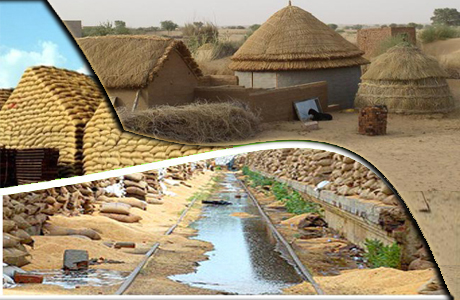Poor grain storage infrastructure
By Mohiuddin Aazim
 About
a dozen companies have shown interest in constructing modern
bulk wheat silos in Sindh on a public-private partnership
basis.
About
a dozen companies have shown interest in constructing modern
bulk wheat silos in Sindh on a public-private partnership
basis.
The bids are expected to
be finalised and evaluated, and the contracts awarded by the
year-end, sources in Sindh’s food department say.
Under this project, modern
silos will be constructed at Karachi and Benazirabad, with
combined storage capacity of 60,000 tonnes.
This will help authorities
make timely wheat procurement from growers, officials say,
adding that after completion of this project, construction
of more silos will be initiated in other parts of the
province.
In Punjab, too, a
multi-grains silos project is underway. Provincial officials
recall that a meeting was held in August to finalise
requests for proposals and other modalities of inviting bids
for this project.
The meeting decided that the
IFC, the private sector lending arm of the World Bank, will
submit complete project proposals based on public-private
partnership. After the approval of these proposals by
provincial authorities, bids will be invited.
Both Sindh and Punjab are undertaking silos building
projects with the IFC’s technical help that had conducted a
study on Pakistan’s need for agricultural storage capacity
building, back in 2010, and had also recommended these
projects.
Under the proposed action
plan 22 concrete silos will be constructed with total
storage capacity of 650,000 tonnes.
Both Sindh and Punjab are undertaking silo-building projects
with technical help from the IFC, which had conducted a
study on Pakistan’s need for agricultural storage capacity
building, in 2010 Poor agricultural storage infrastructure,
resulting in post-harvest losses, continues to take its toll
on food security and depresses exports.
Pakistan Agricultural
Supplies and Storage Corporation (PASSCO), a public sector
entity, is responsible for maintaining strategic reserves of
wheat, rice and sugar.
The provincial food
departments also have wheat godowns but their combined
capacity is too small.
According to a SBP report, based on 2012-13 statistics,
there is a huge gap between the public sector’s total
storage capacity and the actual production of grains and
fruits and vegetables.
These estimates show that
there is room for developing proper storage facilities for
16m tonnes of wheat (against total output of 24.3m tonnes),
4.4m tonnes of rice (against 5.5m tonnes), 4m tonnes of
maize (against 5m tonnes) and 3m tonnes of potatoes (against
3.5m tonnes).
These gaps remain largely
untapped because currently storage facilities in the private
sector are mostly outdated.
That’s why post-harvest
losses of grains range between 15-18pc and that of fruits
and vegetables between 25-40pc, the SBP report reveals.
Lack of proper storage facilities also result in loss of
additional food grains whenever heavy rains and floods hit
the country. The recent floods are no exception.
Media reports say that wheat
stocks at PASSCO warehouses and with the provincial food
departments were partly damaged because in some cases the
stocks were lying in the open and, in other cases, storage
facilities were exposed to heavy rains and seeping of flood
waters.
Thousands of tonnes of grains
stored in old-fashioned mud-houses in farm fields and in
large earthen barrels lying in courtyards of farmers’ houses
were also either washed away or got wet and infested with
pests.
“However, at some places in Punjab where the gush of flood
waters was less-intense and where grains were stored in
plastic or tin containers, or semi-concrete godowns the
damage to grains was relatively low,” says an official of
Punjab agriculture department.
Gaps in storage requirements and available facilities offer
huge business opportunities for companies interested in this
sector.
From ready-to-install
small steels silos to silo-bags there are many ways of
expanding storage infrastructure, officials of provincial
agricultural departments say.
But they lament the lack of
private sector’s interest in investing in storage
facilities. Silo bags are specially designed hermetic bags
that can store up to 60 tonnes of grains under such
conditions that prevent infestation by squeezing oxygen
levels.
Lately, some big landlords in Sindh and Punjab have started
importing Chinese silo bags with prices ranging between
$1000-10,000 per set depending upon their quality, storage
capacity and the material used in manufacturing.
Scarcity of storage facilities has, overtime, given rise to
godown and warehouse-renting.
“We have warehousing sheds of
1000 square meters and more in Port Qasim area and we
regularly rent them out for wheat, rice and sugar storage,”
says Muhammad Anwar, manager of one of these warehouses.
“Normally these sheds are
taken on rent by importers and exporters. But during heavy
rains or floods, landlords from interior of Sindh shift
their stocks of grains or seeds into these sheds for
protection.”
After the 2010 super floods, such global organisations like
UNHCR and WFP had also used these commercial godowns and
warehouses for storing food and other relief goods for
onward distribution among the flood-affected people.
October, 2014
Source:
Dawn News